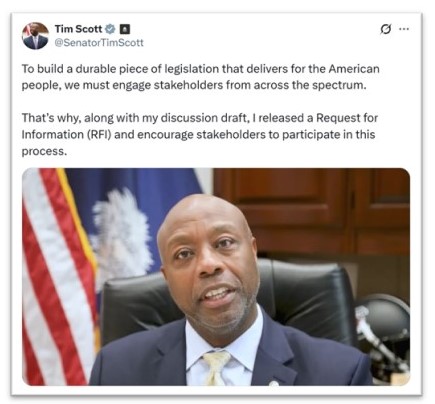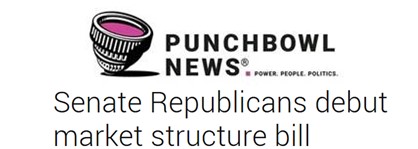ICYMI: Scott Continues Push to Provide Regulatory Clarity for Digital Assets
The draft follows the set of principles released by Chairman Scott and his colleagues for the development of comprehensive market structure legislation, as well as the committee’s hearing on the importance of providing regulatory clarity for digital assets.
Washington, D.C. – Last week, President Donald J. Trump signed into law the Guiding and Establishing National Innovation for U.S. Stablecoins (GENIUS) Act – legislation Chairman Tim Scott (R-S.C.) co-sponsored and championed as it advanced through the Senate – to establish a regulatory framework for payment stablecoins.
Yesterday, building on the success of the GENIUS Act, as well as the CLARITY Act that passed the House of Representatives, Chairman Scott and his colleagues introduced an initial discussion draft of digital asset market structure legislation covering issues under the Banking Committee’s jurisdiction.
The draft follows the set of principles released by Chairman Scott and fellow Banking Committee Republicans to guide discussions and negotiations for the development of comprehensive market structure legislation, as well as the committee’s hearing on the importance of providing regulatory clarity for digital assets. Chairman Scott also recently joined Subcommittee on Digital Assets Chair Cynthia Lummis (R-Wyo.) and Executive Director of the President’s Council of Advisers on Digital Assets Bo Hines for a conversation on the principles and the legislative pathway forward.
Click here or on the image above to watch the video.
Along with the discussion draft, Chairman Scott and his colleagues issued a Request for Information (RFI) for stakeholders to submit feedback on the draft and on a wide range of questions. Chairman Scott emphasized the importance of the RFI to ensure stakeholders can participate in the legislative process and help build a durable piece of legislation that delivers for the American people.
Click here or on the image above to read the article
The Block: “Republican Senate Banking Committee Chair Tim Scott and other lawmakers are moving forward with their cryptocurrency market structure bill that they say expands work done on a bill passed out of the U.S. House of Representatives last week. Scott, alongside Republican Sens. Cynthia Lummis, Bill Hagerty, and Bernie Moreno, released a discussion draft of crypto market legislation and also issued a request for information on Tuesday”
Click here or on the image above to read the article
Cryptopolitan: “Senator Tim Scott, the lead on the release of the draft, commented, ‘I’m grateful for the hard work of our House counterparts to craft smart, bipartisan legislation, and I look forward to building on their work here in the Senate. Working with President Trump, we can deliver a comprehensive, bipartisan regulatory framework for digital assets.’”
Click here or on the image above the read the article.
CoinDesk: “The draft follows the introduction of principles from the Senate Banking Committee last month that Chairman Tim Scott said would ‘serve as an important baseline’ for the bill. It largely focuses on the SEC, rather than the CFTC, primarily directing it to engage in rulemaking around ancillary assets and disclosure requirements.”
Click here or on the image above to read the article
Punchbowl: “The industry, meanwhile, is excited about the prospect of this request for information. The document released by Banking Republicans said the committee will use responses to ‘inform market structure legislation’”
Click here or on the image above to read the article
Axios: “This is the legislation that will define how the issuance and trading of cryptocurrencies will be regulated, updating laws for the new realities afforded by blockchain technology.”
Click here or on the image above to read the article
Politico Pro: “Like the House’s so-called CLARITY Act, the Senate proposal would divvy up oversight of digital assets between the Securities and Exchange Commission and the Commodity Futures Trading Commission. It includes key differences from the House’s plan, including provisions that would create a new category of digital tokens called ‘ancillary assets’ that are not securities.”
Next Article Previous Article







